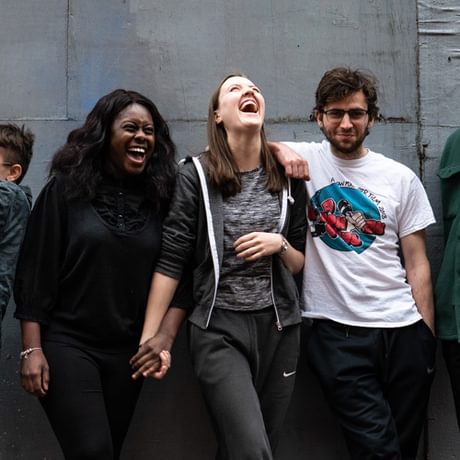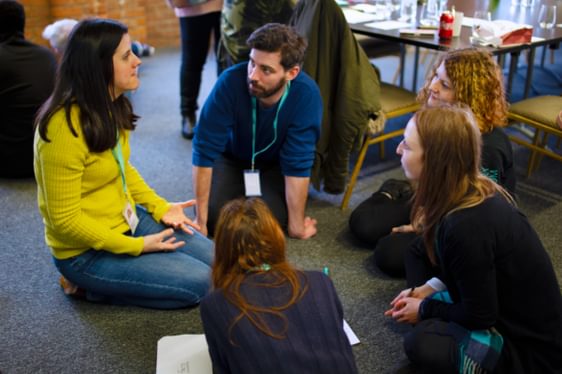Manifesto of Care
About UsManifesto of Care
Manifesto: a public statement of beliefs, aims and policies. If you want to make change, it helps to have a plan.
Image gallery
At Contact we created a Manifesto of Care – a public statement of the beliefs and rules that should shape a caring arts institution.
The Manifesto informs Contact’s vision and working practice, which we then develop into a set of principles and rules for our caring institution. This helps us to better look after our staff, artists, young people, audiences and freelancers.
Find out more
How Did We Do It?
To create this Manifesto, we started off by asking ‘what would happen if we made care central to Contact?’
We talked about the meaning of care – and our Manifesto is informed by the work of writers and artists who have been thinking about care for a long time.
We quickly found that we couldn’t talk about care, without talking about exploitation.
Exploitation is the act of treating someone unfairly in order to benefit from them.
The world is exploitative, and this makes it hard to live in.
Within the arts industry, exploitation can take many forms. Artists and arts workers are often asked to do too much, for too little. Young people and audiences can be treated less as individuals, and more as numbers for data reporting. ‘The show must go on’ can often translate to ‘the ends justify the means’.
As an arts institution, it’s hard for us to make things less exploitative when the world as a whole works that way. But we still absolutely have a responsibility to try.
Contact’s Manifesto of Care is one way of trying. We’ll make mistakes, but our Manifesto is something to hold us accountable for those mistakes. It’s made up of six guiding principles and a patchwork quilt of specific promises, because both are important. The patchwork is also inspired by artist Audrey Albert’s creative response to our Manifesto of Care consultations. It felt like the best way of representing and bringing together the many different voices and perspectives that informed us.
Nothing About Us Without Us is one of our Manifesto’s guiding principles. It was also crucial to the writing of it. Our Manifesto has been created through consultations and conversations with young people, artists, freelancers, audiences, people who have never been to Contact, and our staff.
What Are Our Six Guiding Principles?
All bodies are welcome, and all brains are welcome
At Contact we want to make our spaces, events, and opportunities as accessible as they can be. Society as it stands is set up to disable some people and to privilege others. There’s a long way to go to counteract this, so we need to commit. Everyone who comes to Contact should feel welcome and valued.
The ends do not justify the means
A lot of us in the arts have stories about incredibly stressful, and distressing, working experiences. As one staff member said, no one at Contact should have an ‘ominous sense of dread’ about coming to do their job. Our sector is full of enthusiastic, caring people, but it’s also underfunded – and because of this we often work beyond our healthy capacity to make art happen. It’s the responsibility of those in leadership positions at Contact to set healthy boundaries and expectations for staff, artists, freelancers, and participants.
Nothing About Us Without Us
This principle has emerged from disability activism, and it’s crucial to the way we should be doing things at Contact. If we are planning to make decisions that affect the young people we work with, or that affect artists, freelancers, and audiences, or that affect specific communities of identity, we need to find ways to involve those people in our decision making.
We need to be safe, even when taking risks
As much as we want to minimise distress, we know that making art is difficult. Performing, creating, going out of your comfort zone – these things often involve risk. Our work at Contact can be especially risky when artists are drawing on traumatic lived experience to share stories, or when we’re introducing young people and audiences to unfamiliar things. There need to be ways for people to express if they feel unsafe, or uncomfortable. Unsafe situations should not be allowed to continue.
Equity is key to reaching equality
Equality means ensuring everyone has the same opportunities and receives the same treatment. But in an unequal world, certain people face systemic barriers to accessing ‘equal’ opportunities. Some people wouldn’t even step through Contact’s doors, because they don’t see it as their space. Equity means exploring what individual people and groups need to be able to access opportunities at Contact, and putting specific measures in place to achieve equal outcomes. When systems and spaces become more equitable in the long term, that can be called justice.
Everyone’s journey is different
Sometimes policies and manifestos can feel like big sweeping statements that don’t apply much to individuals. At Contact we want to pay attention to individuals, and our policies and working practices need to be flexible around individual needs (which are always subject to change). Some people’s journey through Contact goes from A to B. Some people’s journey goes from A to B to C to M. Some people’s journey starts at J then goes back to A. Part of the joy of the arts is that there’s no one ‘right’ way to do things.
What Are Our Patchwork of Promises?
- We will ensure our staff understand the difference between equity and equality
- We will be open about embedding principles of equity into our working practice
- In our discussions around equity, we will acknowledge that power imbalances in society are the result of long histories
- We will make space for staff, artists, freelancers, young people, and audiences, to tell us how they are and how they feel
- We will ask all those we work with about their working needs and expectations before we contract them, and we will be clear with them as to whether we will be able to fulfil those needs and expectations
- We will pay wages and freelance rates at industry standard or above
- We will challenge industry standard rates where it is evident they are not high enough
- Until treatment is more widely available within the NHS, we will offer mental health support for artists making work about traumatic experiences if they do not have this support already – this is as crucial as giving them a venue to perform in
- We won’t ask people to do unpaid work of any kind
- We won’t require people to work beyond their healthy capacity (and we will support those we work with to understand what their healthy capacity is)
- Data is a valuable commodity in a capitalist society. We will be transparent about this when we collect data
- Our staff will be visible and contactable
- We will create a working culture where it is safe to make mistakes, but it is also safe to take responsibility for our mistakes
- We make our spaces as accessible as we can, and fundraise to meet gaps in access provision
- We will support our staff members with their ambitions
- People will be able to spend time in Contact’s communal spaces without buying anything
- We will create spaces for young people to enjoy that are not focused on outcomes – where nothing needs to happen
- We will make room for joy and celebration in our working lives
- We will not treat others as lesser than ourselves – we won’t bully, dismiss or condescend
- We will add to this Manifesto as needed





